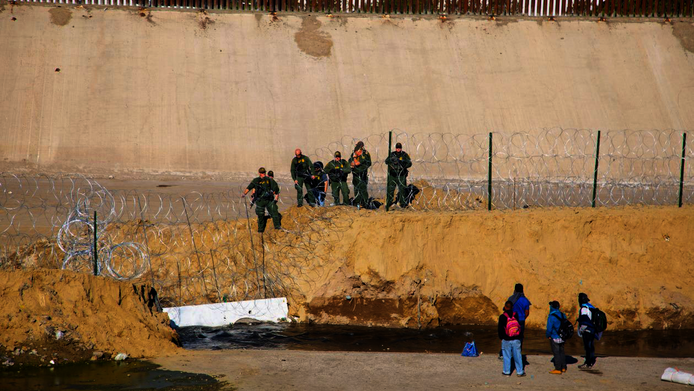Dilemma for Europe's border management

This is a topic that is here to stay: European migration and refugee policy. For example, the recent clashes at the Greek-Turkish border have once again reminded us of the complexity of European border control policy. In the course of debates on border security, the EU agency Frontex has come into focus. In 2005, Frontex was entrusted with the task of coordinating the EU's external border management. Over the past 15 years, the Agency has grown steadily, and its expertise and resources have been expanded, particularly in the wake of the migration peak in 2015. From the outset, however, Frontex has also been criticized for violating human and fundamental rights. “In 2005, fundamental rights were not mentioned at all in the Agency's guidelines,” confirms political scientist Peter Slominski.
Fundamental rights concerns and ambiguities
In a project funded by the Austrian Science Fund FWF and based at the University of Vienna, Slominski, together with political scientist Chiara Loschi, is investigating the role of Frontex and other EU agencies in border management in the European Union. Slominski is primarily interested in the question of whether and how agencies cooperate and what the situation is regarding compliance with basic and human rights. “Since Frontex has no sovereign authority, but only supports the member states when they express a need, the agency initially argued that fundamental rights are safeguarded by the nation states,” Slominski explained. But criticism persisted, partly because the scope for action of Frontex as a European institution involves many ambiguities.
Growing cooperation and competences
Given the sensitivity of the issue, Frontex has now taken individual steps and committed itself to fundamental rights by drawing up a code of conduct. A reform of the Agency in 2010/11 brought further changes. Separate bodies, such as the Consultative Forum, have been set up, and experts in fundamental rights have been appointed to carry out internal audits of the Agency's activities to ensure that they comply with fundamental rights. “Since then, the other agencies have also been more involved,” says Peter Slominski. Frontex cooperates, inter alia, with the European Asylum Support Office (EASO) and the European Fundamental Rights Agency (FRA) based in Vienna. The workings of the cooperation between Frontex and these two agencies is at the focus of Slominski’s research. “The agencies meet regularly and the political commitment to cooperate has been given an institutional basis,” Slominski explains. The cooperation between the three agencies also gained in significance in practical terms in 2015, when the EU reacted by setting up hotspots in the countries most affected by migration, such as Greece or Italy. The measure was designed to help identify and register arriving refugees quickly and to implement the planned redistribution among the Member States. Frontex and EASO helped to set up the appropriate infrastructure in the hotspots, provide equipment, assist in processing asylum procedures, and FRA conducts training. “In this context, the agencies are highly visible and cooperate with each other, which has given them a boost in competence,” notes Peter Slominski, who has conducted numerous interviews with people in charge. However, there is still no answer to the issue of redistribution, on which a political consensus has still not been achieved. With the result that many refugees remain in the camps or are “waved through” to other countries.
The lowest common denominator
“The agencies only work if the member states cooperate,” is how Slominski sums up the situation. EU agencies like Frontex are a compromise solution of the European institutions. Although they operate independently in everyday life, they have no decision-making powers. This means that the agencies often exercise more powers than they are formally entitled to. As a result they are able to act quickly and flexibly, but on the downside a lot of what they do happens in a grey area. Slominski himself is not entirely clear about what this says about EU border policy, also in view of the additional fact that Frontex is to increase its staff numbers to 10,000 by 2027. “I suppose the plan is to create pools of border guards who are now already operating,” explains Slominski. In any case, the researcher adds, there is only agreement among the member states on the commitment to secure borders, which creates an imbalance within the European Union. And there is also the unanswered question as to what extent the agencies, which cannot operate independently of state authorization, act in conformity with fundamental rights, or whether there are gaps in legal protection. Slominski is convinced that even if the importance of the agencies grows, there will be no getting around more fundamental measures in the long term, such as a reform of the Dublin regime and a strengthening of intra-European solidarity.
Personal details The political scientist and sociologist Peter Slominski is conducting research at the Centre for European Integration Studies EIF at the University of Vienna. He is exploring questions of European integration with a focus on EU migration and climate policy. The FWF-funded project “EU Border Management” will run until autumn 2020. Political scientist Chiara Loschi is a researcher at the Centre for European Integration Studies EIF at the University of Vienna. Her research focuses on EU border management policy and fundamental rights as well as Middle East and North Africa (MENA region) policy.
Publications





